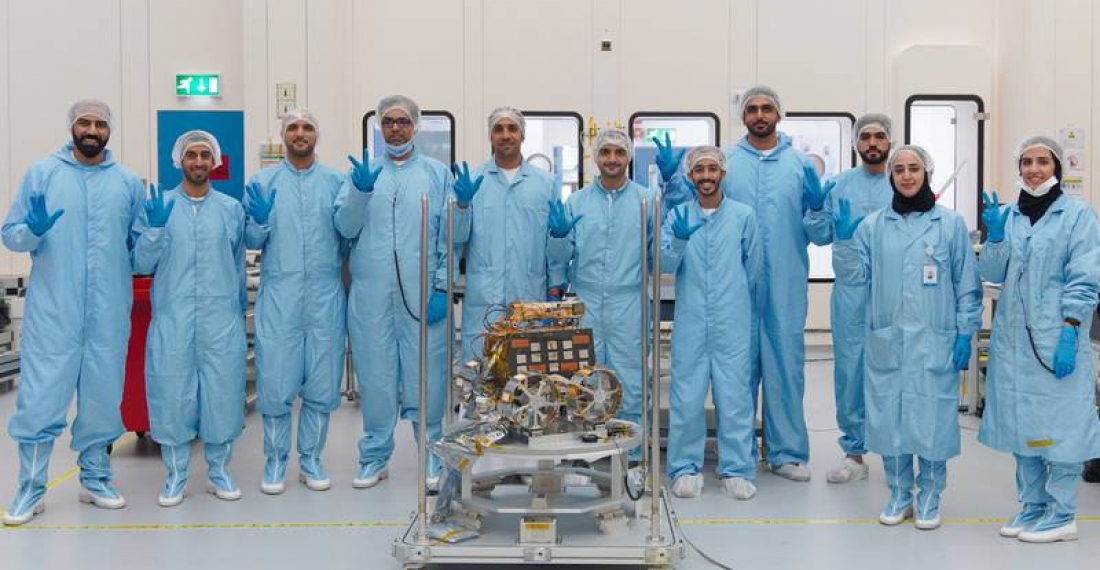On the eve of its National Day being marked on Friday (2 December), the United Arab Emirates will today become the first Arab country to send a mission to the moon.
The UAE Rashid Rover, the first Emirati mission to the Moon surface, on Tuesday was integrated into a SpaceX Falcon 9 rocket for its historic launch on Wednesday. The four-wheel rover has undergone its final integration process with the launch vehicle - the Hakuto-R Mission 1 lander – which will launch from a spaceport at the Cape Canaveral Space Force Station in Florida at 12:39 pm UAE time.
The Rashid rover - built by Emirati engineers from the UAE’s Mohammed bin Rashid Space Center (MBRSC) - is to be sent to regions of the Moon unexplored by humans.
As part of the Emirates Lunar Mission, the 10-kilogram robotic explorer will send back images and collect data on lunar soil and dust once it reaches the lunar surface.
As part of the Emirates Lunar Mission, the 10-kilogram robotic explorer – which has been built in the UAE by Emirati engineers working with the Mohammed Bin Rashid Space Centre (MBRSC) - will send back images and collect data on lunar soil and dust once it reaches the Red Planet. (Supplied)
The reviews were designed to test out every one of the multitudes of systems and subsystems of the rover during the launch stage, cruise stage, and descent stage.
At the beginning of the year, the ELM rover completed the assembly and first set of full functional tests of the flight model in the laboratories of MBRSC. This phase of testing included assessments of all the functionality of the hardware and software within all the possible on-surface (lunar) scenarios.
This phase also included a heavy vibration test of the model at the EDGE’s Electro-Optics Center of Excellence (EOCE) laboratories based in Abu Dhabi.
In the second phase, the Rashid rover completed a series of environmental tests in Toulouse, France.
This included two sections of the evaluation: The first was the final thermal and vacuum tests within the Airbus facility, in which the Rover was heated and cooled to simulate the pressures and temperatures of its journey through space and on the Moon’s surface.
The second and last section of the environmental tests included rigorous vibration and shock checks of the flight model at the CNES Labs.
For this, the rover was shaken on a vibration table simulating the environment the rover will encounter during the launch atop a SpaceX Falcon 9 rocket as well as be subjected to the same shocks it will experience decelerating in the lunar atmosphere, the intense impact of deployment and touchdown.
The tests campaign concluded in Germany with the final phase of checks on the interfaces with the space lander that will safely deliver the rover to the Moon’s surface. This phase also included instrument alignment checks, such as imaging systems, and a final functional test of the integrated system following the environmental campaign.
Dr. Hamad al-Marzooqi, Project Manager of the Emirates Lunar Mission, said earlier this year: “MBRSC can’t wait to see Rashid rover begin its long-awaited flight to the Moon. The science and technology of this mission are going to help us address major questions about the geologic and surface science of the Moon that we’ve been working on for years, and we’re excited to share our journey with the world.”
The primary goal of the mission is to study the Moon’s plasma and to provide answers about Moon dust, the lunar surface, mobility on the Moon’s surface, and how different surfaces interact with lunar particles.
With this mission the UAE becomes only the fourth country to send a mission to the moon. This scientific achievement is being launched as the country prepares to mark the anniversary of its foundation on 2 December 1971.






